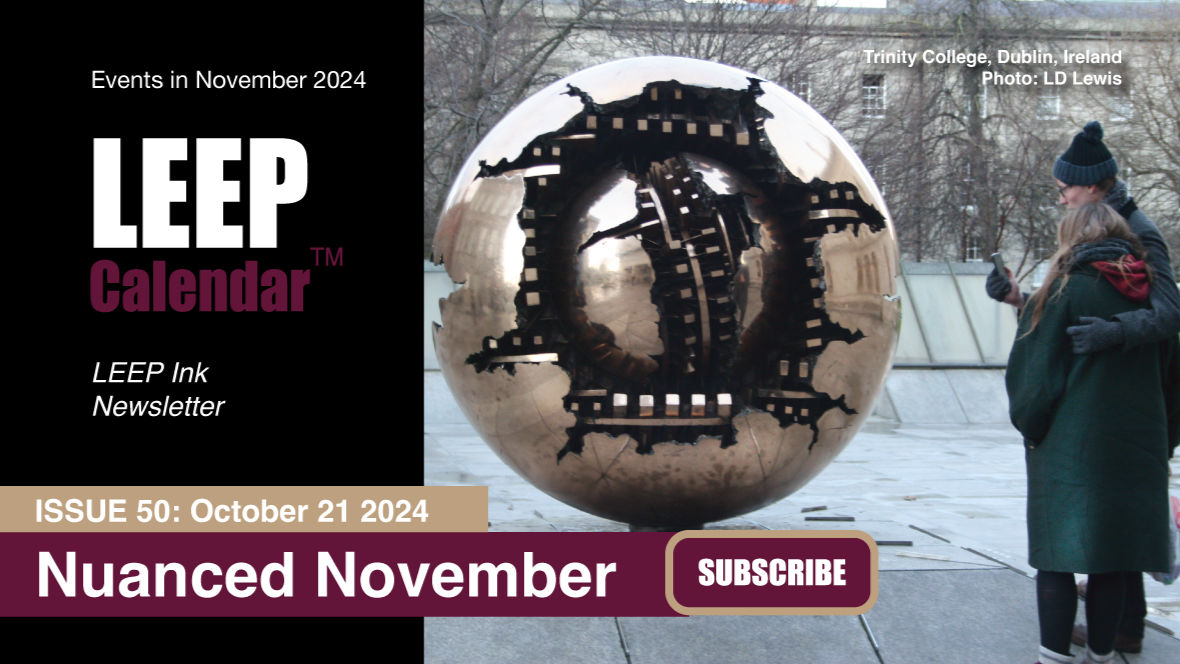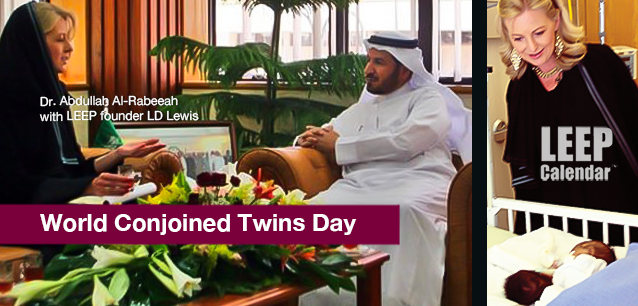 AD
AD
Today is: December 18
Scroll to explore events active on this date.
LEEP INK FEATURES

2025 is the Year of...
21 Themes and 'Year of' Events for 2025 PART ONE, THE FIRST 12 Every year, various organizations announce the theme for the year. These themes can focus on causes, such as aesthetics and color tre...

Nuanced November 2024
November is the start of the holiday season in many parts of the world. It is a time for family, football, food, shopping and decorating, particularly in the Christian and Jewish world, leading to Christmas and...

December's Gift
Events in December 2024. Well, we made it to December. December is the holiday season, particularly in Western nations, where Christianity and Judaism are the faiths most common in the nation's past. ...
About World Conjoined Twins Day
Health , Lifestyle
Middle East/West Asia
Ends: Nov 24, 2025
DESCRIPTION:
WHEN ONE BECOMES TWO:
WORLD CONJOINED TWINS DAY
World Conjoined Twins Day, celebrated annually on November 24, is a testament to the remarkable strides in medical science. It raises awareness about the unique challenges faced by conjoined twins. It serves as a beacon of hope, celebrating the medical advancements that have significantly improved the lives of many conjoined twins. This initiative is a collective effort supported by various medical organizations, patient advocacy groups, and families of conjoined twins.
EVENT HISTORY
The history of World Conjoined Twins Day is relatively recent, with its establishment driven by a need to bring global attention to the unique circumstances of conjoined twins. The day serves multiple purposes:
—Promoting understanding and acceptance
—Highlighting the medical advances in separation surgeries
—Supporting families and healthcare professionals involved in the care of conjoined twins
SAUDI ARABIA'S LEADERSHIP IN CONJOINED TWIN SEPARATIONS
Saudi Arabia has emerged as a global leader in conjoined twin separations, thanks to its advanced medical facilities and the commitment of its healthcare professionals. The country's success in this area originates from the Saudi Conjoined Twins Program, based at the King Abdullah Specialist Children's Hospital in Riyadh.
The program, established under the patronage of the Saudi government, has conducted numerous successful separation surgeries since its inception in 1990. Surgeries are paid for by the government of Saudi Arabia, not the families of the children. Once identified, the Kingdom brings suitable patients and their families to Saudi Arabia, performs the operations, pays their expenses and supports them through recovery regardless of race, religion, nationality, social status, gender or economic status.
Saudi Arabia's program is renowned for its multidisciplinary approach, involving specialists in pediatric surgery, anesthesiology, cardiology, neurosurgery, and other fields to ensure comprehensive care for conjoined twins.
DOCTOR ABDULLAH AL-RABEEAH
Dr. Abdullah Al-Rabeeah, the prominent Saudi pediatric surgeon, is a pivotal figure in this program. Dr. Al-Rabeeah has led the majority of complex separation surgeries and is internationally known for his expertise and dedication. Under his leadership, the Saudi Conjoined Twins Program has become a beacon of hope for families worldwide.
NOTE: This writer, LEEP's founder, was fortunate to spend two hours interviewing Dr. Al-Rabeeah in 2008 at the National Guard Hospital in Riyadh, Saudi Arabia. We visited two families whose children had been successfully separated, speaking to the proud parents and learning about the program. Not only is he brilliant, but he is also a warm, wonderful, and caring person. He and I are pictured above in the masthead image for this event.
UNDERSTANDING CONJOINED TWINS
Conjoined twins are identical twins whose bodies are physically connected at birth. This rare phenomenon occurs when a single fertilized egg fails to separate into two individuals completely. The degree and location of the connection vary, with common sites including the chest, abdomen, and pelvis.
LIFE AS A CONJOINED TWINS
Life for conjoined twins can be challenging. They may face physical limitations, medical complications, and social stigma. Daily activities, mobility, and personal space are significantly affected, requiring unique adaptations and support. Psychological and social support is essential for their well-being, and many conjoined twins develop strong, interdependent bonds that help them navigate these challenges.
SEPARATION OF CONJOINED TWINS
The possibility of separation depends on the type and extent of the connection and whether the twins share vital organs. Approximately 60% of conjoined twins can be successfully separated, though the complexity of each case varies. Successful separation surgeries often require extensive planning, advanced medical technology, and a skilled multidisciplinary team.
World Conjoined Twins Day aims to illuminate the lives of conjoined twins, celebrate medical advancements, and encourage a supportive and inclusive society. Raising awareness and understanding hopes to improve the quality of life for conjoined twins and their families worldwide.
VIDEOS
SUPPORTING DOCUMENTS
Currently, this event does not have supporting documents.
ADDITIONAL IMAGES
Currently, this event does not have supporting images.
Where would you like to go now?
 AD
AD


/footer-logo.svg)
